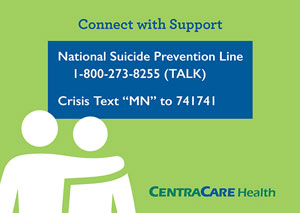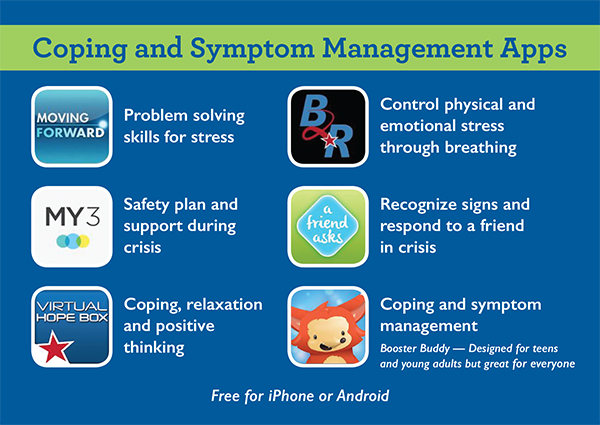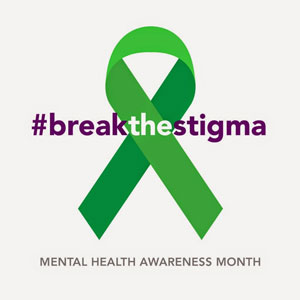Break the stigma
Suicide Prevention Program Manager
CentraCare Health
This year marks the 70th anniversary of celebrating Mental Health Awareness month. Over that time, brave individuals and organizations have used this observance to increase public awareness of mental health conditions — helping to break down the silence and stigma that is so isolating to those experiencing symptoms.
Continuing this conversation is important because one in five Americans experiences mental illness. However, 60 percent of adults and 50 percent of youth with mental illness did not receive mental health services in the last year.
While there are many factors that impact a person’s ability to receive treatment, a large one can be mental health stigma. Embarrassment. Shame. Not knowing what help is available or how to get it.
Breaking stigma is important because it is a form of suicide prevention. Mental illness is treatable and recovery is possible. Often, people will speak with a friend, family member or faith leader before they will talk to a mental health professional. By educating yourself about mental health and suicide prevention and taking steps to combat stigma, you will be able to support someone in your life in the recovery process and facilitate him/her seeking professional help.
 So, what can we do to combat stigma?
So, what can we do to combat stigma?
- Talk openly about mental health. The fact that it is common and treatable.
- Educate yourself and others. Learn more about mental health recovery. Attend a Suicide Prevention training. Suicide can be prevented. By knowing the signs and how to get someone help, you can save a life. Visit these sites for more information:
- Be conscious of language. Language matters. Don’t use terms as insults “crazy,” “maniac” or “psycho." Always address the person first, not the illness. “Person with schizophrenia vs. “schizophrenic.”
- Treat physical and mental health equally. So much of what we do physically impacts us mentally — it’s important to pay attention to both your physical and mental health. See below for more information about this important connection.
- Show compassion toward those with mental illness. Provide support to persons with mental health conditions and their families in the same manner you would if they had a physical illness. Call to check in, make a meal, offer to watch their children, visit them in the hospital, send an encouraging card (the list could go on and on). It has been shown that engagement in a community can help the person on their recovery journey.
- Let others know when they are stigmatizing mental health.
- Don’t silently endorse stigma by saying nothing.
#4Mind4Body
This year’s Mental Health Awareness campaign is focusing on #4Mind4Body; exploring the connection between physical health and mental health. Constant stress increases your risk of chronic health conditions like heart disease, but did you know it also increases your risk for anxiety and depression?
A healthy lifestyle can help to prevent the onset or worsening of mental health conditions, as well as chronic conditions like heart disease and diabetes. It also can help people in recovering from these physical and mental health conditions.
Finding ways to tune in each day to our mind-body connection is critically important to achieving overall wellness. Themes of animal companionship, spirituality and religion, humor, work-life balance, and recreation and social connections are being used to support people in boosting their mental health and general wellness. Please click on the links for more information on why these areas are important for our overall wellness, and tips and suggestions on how to incorporate these areas into our lives more fully.
CentraCare wants everyone to know that mental illnesses are real and recovery is always the goal. Living a healthy lifestyle may not be easy but can be achieved by gradually making small changes and building on those successes.
Finding the balance between work and play, the ups and downs of life, physical and mental health can help you on the path towards focusing both #4Mind4Body.
CentraCare is also committed to breaking down stigma around mental health and suicide. Join us in continuing this conversation in our communities by hosting a Suicide Prevention training at your workplace, your community organization, your faith community, your school, or with any group of people who are interested in helping to #BreaktheStigma. For more information about scheduling a Suicide Prevention training please contact: Suicide Prevention Program Manager Lisa Bershok, MSW, LICSW, at 320-251-2700, ext. 23793.
Resources
This blog post is not monitored. If you or someone you know is in crisis or having thoughts of suicide, please contact the National Suicide Prevention Lifeline at 1-800-273-8255.

